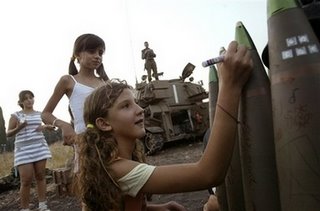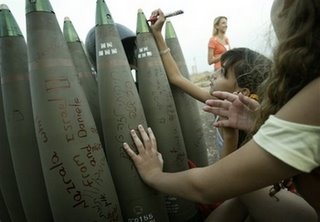A few days ago I read a quote from an Israeli defense official claiming that a strip of southern Lebanon had been cleared of civilians, and that anyone who remained was of Hizbollah and a legitimate target.
I unfortunately can't find that link, but the following stories show how untrue that was. But what the Israeli official was getting at was that Israel now has a free hand to kill anything that moves in a two mile strip of southern Lebanon. Many civilians remain in the south.
Another tactic is to say that they've warned civilians to leave, and that those who remain must be Hizbollah fighters. Some recent news shows that is not the case.
This is not to imply that Israel is trying to kill civilians, but it is increasingly difficult to bear the claim that Israel is somehow more moral than its enemies.
An Israeli bombing raid killed or wounded as many as 50 people in the southern Lebanese town of Qana, a day after U.S. Secretary of State Condoleezza Rice resumed Middle East talks aimed at stopping the fighting.
Israeli warplanes bombed a three-storey building in Qana, leaving 50 casualties, including 21 children, Lebanon's state-run Teleliban television reported, citing its reporters at the scene. Israel attacked Hezbollah rocket launchers in the area and the incident is being investigated, said an Israeli army spokeswoman. Civilians were warned to leave several days ago, she said.
Both belligerents are attacking indiscriminately. Hizbullah's weapons are notoriously inaccurate and more likely to kill innocent civilians than soldiers. And Israel has targeted noncombatants in southern Lebanon as though the area were a free-fire zone. Lt. Gen. Dan Halutz as much as admitted his contempt for noncombatant immunity when, according to Israeli army radio on July 24, he ordered the destruction of 10 multistory buildings in the Shiite-inhabited suburbs of Beirut for every rocket hitting Haifa.
"
There are still 20,000 children trapped behind the lines of hostility, traumatized and unable to move on," said Jamie McGoldrick, a team leader from the U.N. Office for the Coordination of Humanitarian Affairs. "We still can't reach them."
Naila last set foot in Beirut during Israel's Grapes of Wrath campaign in 1996, and
now she is desperate to escape. But there is no way out. One brother emigrated to Germany years ago; another lives in Beirut. A third brother, the last male relative in Bazuriya, managed to find a place in a car for himself, but not for his sister and mother. "We asked a lot. The people said no," she says. "We just couldn't find a car."
The Israeli army broadcast a warning on its Arabic-language radio station yesterday telling Lebanese in the south that
their villages would be "totally destroyed" if rockets were fired from them.
Adnan al-Hajj, economic editor for the daily newspaper As-Safir, said
Israeli bombing has razed an estimated 2,000 to 3,000 homes, and left a much higher number in partial ruin.
In Gaza, Israel has now started giving "prior warning" to people's whose homes they plan to blow up with air-to-surface missles. As the Palestinian Human Rights Committee reports, and as verified to me by friends in Gaza:
"In the Gaza Strip, on Saturday morning, 30 July 2006, IOF warplanes bombarded two houses in the north. The two houses were destroyed. The owners of the two houses received calls on their mobile phones from the IOF intelligence, in which they were informed that their houses would be attacked in 15 minutes. Thus, the number of houses destroyed by IOF in such a way in ne week has mounted to 10. "
These stories show a clear disregard for civilian casualties in pursuit of military objectives. What makes these deaths somehow more acceptable than those of a Hizbollah katyusha or Hamas qassam?
I'm sure there will be heartfelt apologies, and everyone will be deeply saddened by the loss of innocent life. There will probably even be an official investigation. And then it will happen again.


